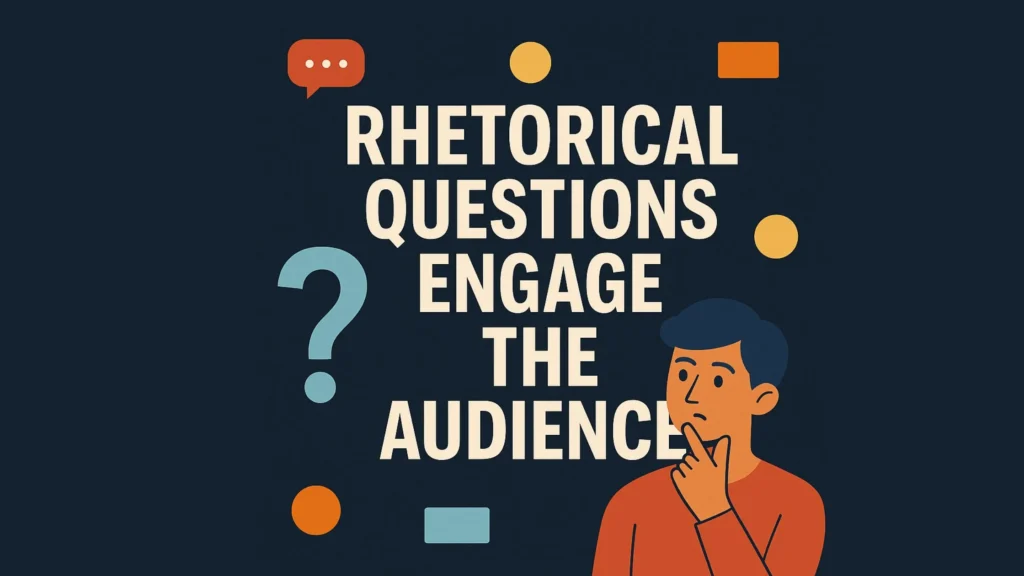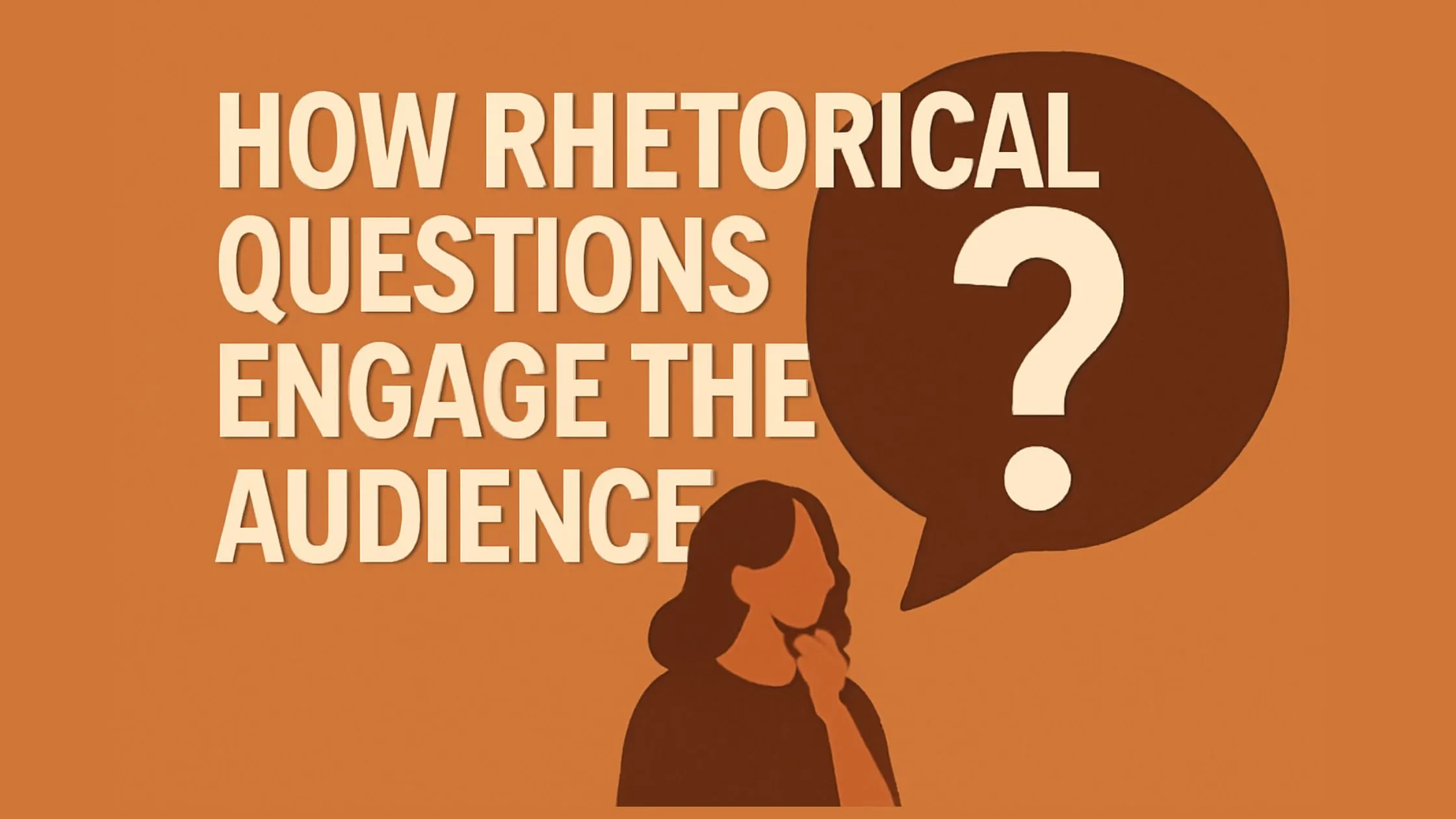Rhetorical Questions Engage the Audience” in powerful ways by sparking curiosity and promoting deeper engagement. In this article, we’ll explore how this effective literary tool can transform the way you connect with your audience. Whether you’re crafting content, delivering speeches, or writing ads, rhetorical questions can captivate your readers and make your message resonate. Read on to discover the key techniques and benefits of using rhetorical questions to keep your audience interested and involved.
Introduction: What Are Rhetorical Questions?
Rhetorical questions are powerful tools used in communication to engage the audience and provoke thought. Unlike regular questions, rhetorical questions are not meant to be answered directly but to stimulate reflection. They are often used to emphasize a point or highlight an idea, making the message more memorable.
Rhetorical questions are effective because they capture the audience’s attention, prompting them to think critically about the topic being discussed. They invite the listener or reader to ponder, often leading to a deeper understanding of the message. In speeches, advertisements, and everyday conversations, they help create a sense of connection by encouraging the audience to engage mentally and emotionally with the content.
Using rhetorical questions can enhance audience engagement by making the communication feel more interactive, even if no verbal response is required. This makes them an essential tool for effective content creation.

How Rhetorical Questions Engage the Audience
Rhetorical questions play a significant role in engaging the audience across various forms of communication, including speeches, literature, and everyday conversations. By posing a question without expecting a direct answer, speakers and writers invite the audience to reflect on the topic, which helps deepen their understanding.
- In Speeches: Rhetorical questions are used to grab attention and make the audience think about the speaker’s point of view.
- In Literature: Authors use them to create tension or emphasize themes, drawing readers into the narrative.
- In Conversations: Everyday use of rhetorical questions keeps conversations lively, making people pause and think.
These questions provoke thought and curiosity by challenging the listener or reader to explore a topic more deeply. Psychologically, they trigger cognitive engagement, activating the brain to seek answers or connect emotionally with the message. This process strengthens audience connection and keeps them focused. Also check the difference between sentences.
Why Are Rhetorical Questions So Powerful in Communication?
Rhetorical questions are powerful tools in communication because they have a significant cognitive and emotional impact on the audience. Here’s why:
- Cognitive Impact: Rhetorical questions make the audience reflect deeply on the message. They prompt listeners or readers to think critically about the topic, often leading to better retention of information.
- Emotional Appeal: These questions can spark curiosity or empathy. By asking questions that evoke emotions, communicators can connect with their audience on a more personal level, making the message more memorable.
- Encourage Self-Reflection: Rhetorical questions invite the audience to reflect on their own experiences and beliefs. This type of engagement encourages interaction, even if it’s internal, making the communication feel more dynamic and engaging.
This combination of cognitive stimulation and emotional appeal makes rhetorical questions a powerful communication tool.
Key Benefits of Using Rhetorical Questions to Engage Your Audience
Rhetorical questions offer several key benefits that make them effective tools for engaging an audience. Here’s how they help:
- Instantly Grab Attention: Rhetorical questions capture the audience’s attention right away. By asking a thought-provoking question, they create curiosity and make the audience eager to hear more.
- Stimulate Critical Thinking: These questions challenge the audience to think critically about the topic. They push the listener or reader to analyze the message on a deeper level, which increases engagement.
- Strengthen the Emotional Connection: Rhetorical questions can tap into the emotions of the audience, making the communication feel more personal. They evoke feelings of empathy, interest, or even humor, which strengthens the connection.
- Invite Participation Without Direct Answers: These questions encourage the audience to mentally engage without requiring verbal responses. This makes the experience more interactive and keeps the audience actively involved.
Using rhetorical questions helps make communication more dynamic and impactful.
How Rhetorical Questions Enhance Persuasion and Influence
Rhetorical questions are a powerful tool for persuasion and influence, as they can subtly guide the audience toward agreement. Here’s how they help:
- Creating a Sense of Agreement: By posing questions that the audience is likely to agree with, rhetorical questions help align the speaker’s message with the audience’s thoughts, making it easier for them to accept the message.
- Establishing Rapport with the Audience: Rhetorical questions create a conversational tone, making the speaker appear more relatable and approachable. This rapport builds trust, which is crucial for effective persuasion.
- Providing a Sense of Inclusion and Shared Understanding: When rhetorical questions are used, they make the audience feel included in the conversation. It gives them a sense that the speaker values their opinions and experiences, fostering a deeper connection.
Using rhetorical questions in this way can make communication more compelling and persuasive.
How to Effectively Use Rhetorical Questions to Keep the Audience Engaged
Using rhetorical questions effectively can significantly enhance audience engagement. Here are some tips for making them work in your content:
- Timing and Placement: The timing and placement of rhetorical questions are crucial. Asking them at the right moment can grab attention and emphasize key points. Position them at transitions or before important revelations to increase impact.
- Ensuring Relevance: Rhetorical questions should always be relevant to the topic and resonate with the audience’s interests. This helps keep the content focused and ensures the audience stays engaged with the message.
- Use in Storytelling or Speeches: In storytelling or speeches, rhetorical questions can add drama and enhance emotional impact. They create suspense, provoke thought, and encourage listeners to mentally participate, making the experience more immersive.
By using rhetorical questions strategically, communicators can maintain the audience’s interest and deepen their connection to the content.
Common Mistakes to Avoid When Using Rhetorical Questions
When using rhetorical questions, it’s essential to avoid common mistakes that can lessen their effectiveness. Here are the key mistakes to watch out for:
- Overuse of Rhetorical Questions: Using too many rhetorical questions can overwhelm the audience and dilute their impact. It’s important to use them sparingly and strategically to keep the audience engaged.
- Using Unclear or Overly Complex Questions: Rhetorical questions should be simple and clear. If they are too complex or hard to understand, they may confuse the audience rather than encourage reflection.
- Not Aligning the Question with Audience Expectations: The question should resonate with the audience’s interests or experiences. If the question feels disconnected or irrelevant, it can cause the audience to disengage.
By avoiding these mistakes, rhetorical questions will be much more effective in keeping the audience engaged.
Real-World Examples of Rhetorical Questions That Engage the Audience
Rhetorical questions have been widely used in various forms of communication to engage and persuade audiences. Some famous speeches and pieces of literature provide excellent examples of how effective these questions can be.
In Martin Luther King Jr.’s “I Have a Dream” speech, he used rhetorical questions to make the audience reflect on the values of freedom and equality, which helped deepen the emotional impact of his message. Similarly, in Shakespeare’s “Hamlet”, the protagonist uses rhetorical questions to explore complex themes, drawing the audience into his inner conflict.
Beyond literature and speeches, advertising and political campaigns also use rhetorical questions to connect with audiences. For instance, commercials often ask questions like, “Why settle for less when you can have more?” to make viewers think about the product’s value. Politicians use rhetorical questions in speeches to unite the audience and provoke thought about pressing issues.
These examples highlight how rhetorical questions can captivate audiences and encourage deeper engagement with the message.
How to Analyze and Adapt Successful Rhetorical Questions for Your Own Content
Rhetorical questions can be a powerful tool in content creation, and adapting successful examples to fit your style can elevate your communication.
When analyzing popular examples, consider tweaking them to match your unique style and voice. For instance, if a famous question has been used frequently, adapt it with a fresh perspective that resonates with your audience. Adding your personal touch ensures that the question remains engaging and original.
Equally important is understanding your audience’s needs. Tailor your rhetorical questions to their interests, experiences, and level of knowledge. This makes the question more relatable and increases the chances of your audience reflecting on it.
By aligning your rhetorical questions with your audience’s expectations, you can ensure that your content stays relevant and engaging, helping to hold their attention and strengthen the message.
Conclusion: The Power of Rhetorical Questions in Audience Engagement
Rhetorical questions are a powerful tool for engaging the audience, encouraging deeper thought, and creating a stronger connection with the message. They capture attention, stimulate critical thinking, and spark emotional responses, making communication more interactive and memorable. By using rhetorical questions strategically, content creators can guide the audience’s thoughts, enhance persuasion, and make the message feel more personal and relatable.
Whether in speeches, literature, or everyday conversations, rhetorical questions help maintain focus, foster self-reflection, and create a sense of inclusion. When used thoughtfully, they can be the key to elevating the effectiveness of any communication, making it more engaging and impactful. In short, mastering the use of rhetorical questions can significantly boost audience engagement and make the message more persuasive and powerful.
FAQ Section
What is the main purpose of a rhetorical question?
The main purpose of a rhetorical question is to provoke thought or emphasize a point without expecting an answer.
How do rhetorical questions affect the audience’s emotions?
Rhetorical questions engage emotions by prompting reflection, sparking curiosity, or creating empathy with the audience.
Can rhetorical questions make writing more engaging?
Yes, rhetorical questions can make writing more engaging by encouraging the audience to think critically and emotionally connect with the content.

